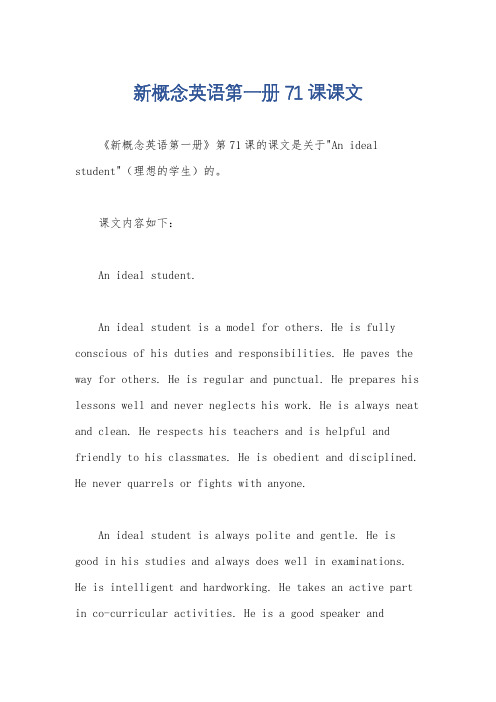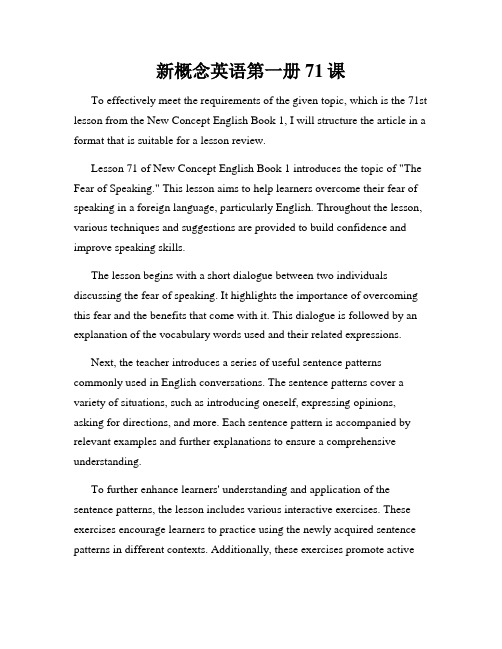新概念第一册71课习题教学提纲
新概念第一册第71课

The day before yesterday The day before yesterday
in the morning
The day before yesterday in the afternoon
The day before yesterday in the evening
The night before last
10
一般过去时
1.) 肯定句:主语+动词过去式+其它
如:He telephoned me four times yesterday.
2.) 否定句:主语+didn’t+动词原形+其它 如:He didn’t telephone me four times
yesterday.
11
一般过去时
3.) 一般疑问句及其回答:
7
翻译练习
TOM是怎样一个人? 他讨厌透了. 他昨天给我打了4次电话. 前天打了3次. 他又打了没有? 没有
8
一般过去时
概念:表示过去某一时间发生的动作 或存在的状态,通常以动词的过去式 表示,其否定句和各种疑问句靠助动 词did构成。
9ห้องสมุดไป่ตู้
一般过去时
1.一般在动词后直接加-ed) answer-answered wait-waited
Yesterday yesterday morning yesterday afternoon yesterday evening Last night
18
过去时句型中常出现的时间状语
Yesterday yesterday morning yesterday afternoon yesterday evening Last night
新概念一册-71课

新概念一册-71课
一般过去时的构成: 陈述句: He arrived home at six o’clock yesterday evening.
We were students three years ago. 一般疑问句: Did he telephone you four times? 肯定回答: Yes, he did 否定回答: No, he didn’t=No, he did not. 特殊疑问句:
她昨天给我打了四次电话.
She telephoned me four times yesterday.
新概念一册-71课
新概念一册-71课
新概念一册-71课
新概念一册-71课
新概念一册-71课
新概念一册-71课
★ answer v. 接(电话)
answer the door/doorbell 应声开门 Mary took a few minutes to answer the door.
新概念一册-71课
finally 和last 的区别: Finally “最后”,adv. 常放在句首, e.g. Finally, she is tired but happy. 最后,她很累但是很开心。 Last “最后的”,adj. 后面可以加名词, e.g. He is the last one to leave the classroom. 他是最后一个离开教室的。
新概念一册-71课
last adj. 最后的,前一个
last week/ month/ year at last 最后
e.g. At last, put some sugar in your coffee. 最后在你的咖啡里加一些糖。 have the last word 说的算
新概念英语第一册第71-72课-He’s awful

新概念英语第一册第71-72课:He’s awfulLesson 71 He's awful!他讨厌透了! Listen to the tape then answer this question.How did Pauline answer the telephone at nine o'clock?听录音,然后回答问题。
波淋在9点接电话时是如何说的?Jane : What’s Ron Marston like , Pauline ?简:罗恩.马斯顿是怎样一个人?Pauline : He’s awful ! He telephoned me four times yesterday , and three times the day before yesterday.波淋:他讨厌透了!他昨天给我打了4次电话前天打了3次。
Pauline: He telephoned the office yesterday morning and yesterday afternoon. My boss answered the telephone .波淋:他昨天上午和下午把电话打到了我的办公室,是我的老板接的。
Jane : What did your boss say to him ?简:你老板是怎么对他说的?Pauline: He said ,”Pauline is typing letters .She can’t speak to you now !”波淋:他说:“波淋正在打信,她现在不能同你讲话!”Pauline : Then I arrived home at six o’clock yesterday evening .He telephoned again .But I didn’t answer the phone !波淋:后来,我昨晚6点钟回到家里。
他又打来电话,但我没接。
Jane : Did he telephone again last night ?简:他昨夜里又打电话了吗?Pauline : Yes , he did . He telephoned at nine o’clock .波淋:是的,打了。
新概念第一册71-72课课件

Don’t blame me!
I promise it will not happen again.
6. There is no reason for complaints.
* complaint 抱怨,不满
7. He is ready to take the blame for the accident.
表达沮丧之情
1. I’m depressed. 我很沮丧 We all lose heart. 我们都泄气了
2. I don’t feel like doing anything. I don’t want to work now. I want to ask for leave.
3. John looks sad. 4. I blew it.
★answer v. 接(电话) ① v. 对……作出反应;响应
• answer the phone/telephone 接电话 • answer the door/doorbell 应声开门 • 玛丽拖了几分钟时间才去开门。
Mary took a few minutes to answer the door. ② v. 回答;答复 • answer a letter 回信 • 我认为你没有回答我的问题。
结束语
谢谢大家聆听!!!
27
* fling 扔、抛 3. Do you have a reason for being late? =Why are you late?
There is a traffic jam. My watch doesn’t work, so I was late.
4. Please do it all over again.
• what’s … like? 什么怎么样? 你们国家的天气怎么样?
新概念英语第一册71课课文

新概念英语第一册71课课文《新概念英语第一册》第71课的课文是关于"An ideal student"(理想的学生)的。
课文内容如下:An ideal student.An ideal student is a model for others. He is fully conscious of his duties and responsibilities. He paves the way for others. He is regular and punctual. He prepares his lessons well and never neglects his work. He is always neat and clean. He respects his teachers and is helpful and friendly to his classmates. He is obedient and disciplined. He never quarrels or fights with anyone.An ideal student is always polite and gentle. He is good in his studies and always does well in examinations. He is intelligent and hardworking. He takes an active part in co-curricular activities. He is a good speaker anddebater. He is also good in sports and games. He is a well-rounded personality.An ideal student is ambitious and has a clear vision of his future. He sets goals for himself and works hard to achieve them. He is focused and determined. He knows the importance of education and strives for excellence in his academic pursuits. He is self-motivated and never gives up easily.An ideal student is not only concerned about his own growth but also about the welfare of others. He is kind and compassionate. He helps those in need and participates in social service activities. He is aware of the issues and challenges faced by society and actively contributes to its betterment.In conclusion, an ideal student is a role model for others. He possesses qualities like discipline, dedication, intelligence, and compassion. He strives for excellence in all aspects of life and works towards personal growth as well as the betterment of society.以上是《新概念英语第一册》第71课的课文内容。
新概念英语第一册71课

新概念英语第一册71课To effectively meet the requirements of the given topic, which is the 71st lesson from the New Concept English Book 1, I will structure the article in a format that is suitable for a lesson review.Lesson 71 of New Concept English Book 1 introduces the topic of "The Fear of Speaking." This lesson aims to help learners overcome their fear of speaking in a foreign language, particularly English. Throughout the lesson, various techniques and suggestions are provided to build confidence and improve speaking skills.The lesson begins with a short dialogue between two individuals discussing the fear of speaking. It highlights the importance of overcoming this fear and the benefits that come with it. This dialogue is followed by an explanation of the vocabulary words used and their related expressions.Next, the teacher introduces a series of useful sentence patterns commonly used in English conversations. The sentence patterns cover a variety of situations, such as introducing oneself, expressing opinions, asking for directions, and more. Each sentence pattern is accompanied by relevant examples and further explanations to ensure a comprehensive understanding.To further enhance learners' understanding and application of the sentence patterns, the lesson includes various interactive exercises. These exercises encourage learners to practice using the newly acquired sentence patterns in different contexts. Additionally, these exercises promote activeparticipation, ensuring learners gain practical experience and confidence in speaking English.To challenge learners and reinforce their learning, the lesson also includes a listening comprehension component. Learners are provided with a short audio clip where they need to listen carefully for specific details. This activity helps develop listening skills while simultaneously familiarizing learners with natural, spoken English.In addition to the provided exercises, the lesson encourages learners to engage in conversation practice outside of the classroom setting. It recommends finding a language partner or joining English-speaking clubs to create more opportunities for speaking English and overcoming fear.Overall, lesson 71 of the New Concept English Book 1 effectively addresses the common fear of speaking in a foreign language. The lesson takes a practical approach by introducing useful sentence patterns, providing interactive exercises, and encouraging real-life conversation practice. By implementing the techniques and suggestions from this lesson, learners can gradually overcome their fear and improve their English speaking skills.In conclusion, lesson 71 of the New Concept English Book 1 serves as a valuable resource for English language learners struggling with the fear of speaking. The diverse range of activities, sentence patterns, and practical tips contribute to the overall effectiveness of the lesson. By systematically addressing the fear of speaking, learners can acquire the necessary tools and confidence to communicate effectively in English.。
新概念英语第一册第71-72课-He’s awful

新概念英语第一册第71-72课:He’s awfulLesson 71 Hes awful!他厌烦透了!Listen to the tape then answer this question.How did Pauline answer the telephone at nine oclock?听录音,然后回答问题。
波淋在9点接电话时是如何说的?Jane : Whats Ron Marston like , Pauline ?简:罗恩.马斯顿是怎样一个人?Pauline : Hes awful ! He telephoned me four times yesterday , and three times the day before yesterday.波淋:他厌烦透了!他昨天给我打了4次电话前天打了3次。
Pauline: He telephoned the office yesterday morning and yesterday afternoon. My boss answered the telephone .波淋:他昨天上午和下午把电话打到了我的办公室,是我的老板接的。
Jane : What did your boss say to him ?简:你老板是怎么对他说的?Pauline: He said ,”Pauline is typing letters .She cant speak to you now !”波淋:他说:“波淋正在打信,她现在不能同你讲话!”Pauline : Then I arrived home at six oclock yesterday evening .He telephoned again .But I didnt answer the phone !波淋:后来,我昨晚6点钟回到家里。
他又打来电话,但我没接。
Jane : Did he telephone again last night ?简:他昨夜里又打电话了吗?Pauline : Yes , he did . He telephoned at nine oclock .波淋:是的,打了。
新概念英语第一册第71课Lesson71课文单词知识点说课材料

新概念英语第一册第7 1 课L e s s o n 7 1 课文单词知识点JANE: What's Ron Marst on like, Pauli ne? PAULINE: He's awful! He telephoned me four times yesterday, and three times the day before yesterday. He telephoned the office yesterday morning andyesterday after noon.My boss an swered the telepho ne. JANE: What did your boss say to him? PAULINE: He said, 'Pauline is typing letters. She can't speak to you now ' PAULINE: Then I arrived home at six o'clock yesterday eve ning. He teleph oned aga in. But I did n't an swer the phone! JANE: Did he telephone again last night? PAULINE: Yes, he did. He telephoned at nine o'clock.JANE: What did you say to him?PAULINE: I said, 'This is Pauline's mother. Please don't teleph one my daughter aga in!' JANE: Did he telephone again? PAULINE: No, he did n't! it 人讨 I 犬的* 坏的 telephone /'teli&uiV v. A n.打电i 占;电IS time taitp础次 t 数) answer ;*a:nsa/ v 接(电 t 舌〕1 \k tcJephoned me four itrneN yesterday,他昨犬给我打了心次41话,"是"动词以外的动词隹过去时中腔启卿种形式4规则动词--股是在动词后面抑-ed,如wer/ans we Fed :以-e 结尾的规则动词<1.加tekphone/iekphoned.iurive/anived □足一-部分韵涮的过去式拼写不电则,同此称为E 規则却词. 心対丫丿胡山山创讯°从本课If 始・单词表中前不规則动词除列出原彫外,还将在括弧中列出过去式 的拼崎和读音&2 股口去甘的勾「中滋常宵表恳过去某-时刻的时佃!状语,如本课申的yesterday 【昨天),the day beforeyesierday l 前 尺《, yesferday morning {昨天 tl 午),yesterday afternoon (昨 天 F 乍 i , yesterday evening (弁尺晚上last night (昨夜八【知识点讲解】1.今天我们开始全面接触过去时态。
新概念第一册71-72课ppt课件

最新编辑ppt
6
③ n. 答案;解决办法;答复
• 我给他写了好几封信,可都没有回音。
I wrote him several letters but couldn’t get an answer.
• 你知道第十题的答案吗?
最新编辑ppt
10
日常用语——受到批评
(一)常用句型——表示批评 1. You have gone too far.
你太过分了。 It’s going a bit too far. It’s really annoying. * annoying 令人烦恼的,令人恼火的
最新编辑ppt
11
2. I keep telling her not to do it, but it just goes in through one ear and out the other.
最新编辑ppt
5
★answer v. 接(电话) ① v. 对……作出反应;响应
• answer the phone/telephone 接电话 • answer the door/doorbell 应声开门 • 玛丽拖了几分钟时间才去开门。
Mary took a few minutes to answer the door. ② v. 回答;答复 • answer a letter 回信 • 我认为你没有回答我的问题。
Do you know the answer to Question 10?
• This is one of the possible answers to today’s environmental problems.
新概念1册Lesson71 教案

Nபைடு நூலகம்w words:
awful adj. 让人讨厌的,坏的 telephone v. & n. 打电话;电话 time n. 次(数);时间 Answer v. 接(电话);回答 last adj. 最后的,前一次的 phone n. 电话(=telephone) Again adv. 又一次地 say (said) v. 说
总结: 一般现在时中,动词不能直接用于提问,需要助 动词do/does来帮忙。含有助动词的句子,动词要用 原形。
含有行为动词的过去时句型
肯定: He played in the park. 否定: He didn’t play in the park. 一般疑问:Did he play in the park? 特殊疑问:What did he do?
am用介词aton和in的时间短语in是老大因为后面所接的都是较长时间月年季节等
Lesson 71
He's awful!
语法课堂
上周语法回顾
回顾: 含有Be动词的句子变过去时,只用把Be动词 改为对应的过去式。 am/ is → was are → were weren't wasn't → am not / isn't → aren't
PAULINE: Then I arrived home at six o'clock yesterday evening. He telephoned again. But I didn't answer the phone! JANE: Did he telephone again last night? PAULINE: Yes, he did.
新概念英语第一册第71课教学内容

一般过去时
yesterday yesterday morning yesterday afternoon yesterday evening last night the day before yesterday the day before yesterday in the morning the day before yesterday in the afternoon the day before yesterday in the evening the night before last
记
2.以不发音的e结尾的动词直接加_d
哦!
telephone---telephoned arrive---arrived
3.以辅音加y结尾的,把y改为i,再加ed
empty--emptied
4.不规则动词have-had forget-forgot
say-said go-went run-ran
do-did take -took
Test time
Revision
phone awful
time
anga[i'telif[ə'ɔul:anf]ustle[]əle'gpehino]ne
[sei] [fəun]
[taim] t answer
['ɑ:nsə]
[lɑ:st]
say
awful adj. 让人讨厌的,坏的 例如:他很讨厌 He's awful!
Key words:
一般过去时的构成:
陈述句:主语+动词过去式+其他 主语+be动词过去式+其他 He arrived home at six o’clock yesterday evening. We were students three years ago
新概念第一册第71课(课堂PPT)

其他语言点
answer the phone 接电话 He telephoned me yesterday. 打电话给某人 He telephoned the office yesterday. 给办公室打电话
21
其他语言点
This is Pauline’s mother. 我是… This is Susan. This is Susan speaking. Who is calling? 你是谁?
34
看电视 昨天晚上
When did they watch TV? They watched TV last night.
35
复习 review
daily expression
规则动词的过去式
there be
What is 某人 like?
they are…
36
37
7
翻译练习
TOM是怎样一个人? 他讨厌透了. 他昨天给我打了4次电话. 前天打了3次. 他又打了没有? 没有
8
一般过去时
概念:表示过去某一时间发生的动作 或存在的状态,通常以动词的过去式 表示,其否定句和各种疑问句靠助动 词did构成。
9
一般过去时
1.一般在动词后直接加-ed) answer-answered wait-waited
did +主语+动词原形+其它?句末用问号。 肯定回答:Yes, …did. 否定回答:No, …didn’t.
➢Did he telephone you four times yesterday? ➢Yes, he did . / No, he didn’t.
12
一般过去时
4.) 特殊疑问句: 特殊疑问词+ did +主语+动词原形+其 它?句末用问号。
新概念英语71课讲义

Lesson71 He is awful 他讨厌透了一、单词与短语awful: adj.令人讨厌的,坏的;awfully: adv.非常,在表示负面情景的过程中可以用awfully 代替very,例:I am very sorry=I am awfully sorry.非常抱歉;telephone:v.打电话;n.电话;time: n.次数,时间;answer:v.接(电话);补充:v.回答,答复;n.答案;例:I do not think you have answered my question.我认为你还没有回答我的问题。
I have read this book several times but could not get an answer. 我读了这本书很多遍了,但还是找不到答案。
last: adj.最后的,前一次的;in the last few years:在过去的几年里。
again: adv.又一次地;again and again:一次又一次地;say: v.说;关于say 需要掌握一个重点句型:It is said that、、、据说、、、It is said that he is a thief.据说他是一个贼。
二、短语句型及语法1、what is Ron Marston like, Pauline?波林,朗·马斯顿是怎样一个人?关于本句需要掌握两个重要句型:①what is sb like? 询问某人的外貌品行、、、What is your father like?你爸爸是一个什么样的人?②what is sth like?、、、怎样?询问事物的状况或状态、、、What is the weather like、、、?天气状况如何?What is the climate like、、、?气候状况如何?2、He telephoned me four times yesterday.他昨天给我打了四次电话。
新概念英语第一册Lesson71~76自学笔记精讲解析

新概念英语第一册Lesson71~76自学笔记精讲解析新概念英语第一册Lesson71~72自学笔记精讲解析1.What’s Ron Marston like, Pauline? 波琳,朗·马斯顿是怎样一个人?What is sb. like? 这一句式可用来询问某人的外貌或品行。
就本课的具体情况而言,波琳的回答更多地是指马斯顿的品行如何。
2.He telephoned me four times yesterday…他昨天给我打了4次电话……four times, 4次。
time在英语中作不可数名词时表示“时间”;作可数名词时表示“次数”。
请注意英语中次数的表示法:once 1次twice 两次three times 3次3次或3次以上通常都用基数词+ times表示:five times 5次thirty times 30次3.the day before yesterday,前天。
4.answer the telephone,接电话。
口语中也常用 answer the phone。
类似的短语如:answer the door/doorbell应声开门answer a letter回信5.She can’t speak to you now! 她现在不能同你讲话!speak to sb. 意为“与某人说话”。
例如打电话时可以说:May I speak to Pauline, please? 请让波琳接电话好吗?I’ d like to speak to Pauline, please. 我想请波琳听电话。
6.This is Pauline’s mother.我是波琳的母亲。
This is…是英美人打电话时表示“我是……”的句式,而不说I’m…。
相关的电话用语如:This is Mary speaking. 我是玛丽。
This is Edward calling from London. 我是爱德华,现正在伦敦给你打电话。
- 1、下载文档前请自行甄别文档内容的完整性,平台不提供额外的编辑、内容补充、找答案等附加服务。
- 2、"仅部分预览"的文档,不可在线预览部分如存在完整性等问题,可反馈申请退款(可完整预览的文档不适用该条件!)。
- 3、如文档侵犯您的权益,请联系客服反馈,我们会尽快为您处理(人工客服工作时间:9:00-18:30)。
新概念第一册71课
习题
新概念一L71-72练习题姓名________ 分数_________
一、英汉互译
1、让人讨厌的,坏的
2、打电话,电话
3、次(数)
4、接(电话)
5、最后的,前一次的
6、电话
7、又一次地 8、说
9、昨天下午 10、前天
11、昨夜 12.telephone him
13.four times 14.Beijing time
15.answer the phone st night
二、用动词的正确形式填空。
1.Look! The boys___________________(play) football there.
2.I enjoy_________________(listen) to the radio very much.
3.I________________(be) at home yesterday.
4.She didn't__________________(call) the doctor the night before last.
5.What did he_______________(say) to you yesterday?
6.He______________(live) in Beijing last year.
7.They________________(not be) at school the day before yesterday.
8.She_____________________(not open) the box yesterday.
9.We________________(see) our teacher tomorrow.
10.She often__________________(enjoy) herself.
11.She_________________(call) the doctor the night before last.
12.She_______________(not open) the box last night.
13.It______________(rain) heavily yesterday.
14.He_______________(get) up very late yesterday morning.
三、按要求写出动词正确形式。
1.is _________________(过去式)
2.answer ________________(过去式)
3.do _________________(过去式)
4.say _________________(过去式)
5.telephone _________________(过去式)
6.play _________________(单三)
7.am _________________(过去式) 8.are _________________(过去式)
9.arrive _________________(现在分词) 10.enjoy _________________(现在分词) 11.hurry _________________(过去式) 12.phone _________________(现在分词)。
